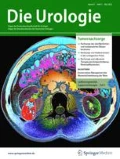Zusammenfassung
Zytokine sind zelluläre Botenstoffe, die bei einer Vielzahl von biologischen Prozessen einschließlich Immunabwehr und Reproduktion eine essentielle Rolle spielen. Seit einigen Jahren werden Zytokine zunehmend bei verschiedensten urologischen Erkrankungen im Ejakulat bestimmt. Um den aktuellen Stellenwert der Zytokindiagnostik im Ejakulat zu evaluieren, haben wir eine systematische Literatursuche im Rahmen unseres Schwerpunktes „Männliche Infertilität bei Infektion & Entzündung“ (MIBIE) durchgeführt. Aus 581 Publikationen konnten 124 Originalarbeiten mit insgesamt 31 untersuchten Zytokinen als relevant identifiziert werden, die sich in drei Kategorien einteilen ließen: Fertilität, Infektionen und chronische Prostatitis. Die Datenanalyse zeigt, dass keine Assoziation zwischen Zytokinprofilen und Ejakulatqualität bzw. Fertilität besteht. Hingegen können Zytokine bei Diagnostik und Therapiemonitoring von urogenitalen Infektionen/Entzündungen hilfreich sein. Ob es sich hierbei um einzelne oder eine Kombination verschiedener Zytokine bei den jeweiligen Krankheitsbildern handelt, müssen zukünftige Studien klären.
Abstract
Cytokines are cellular messengers which play a key role in many biological conditions such as immune defence and reproduction. During recent years analysis of seminal cytokines has become of increasing interest in various pathologies. To evaluate the current role of seminal cytokines we performed a systematic literature search within the framework of our focus group “Male Infertility during Infection and Inflammation – MIBIE”. Out of 581 manuscripts we identified 124 original articles which investigated a total of 31 different cytokines. These studies can be categorized according to the following three topics: infertility, infections and chronic prostatitis. The current analysis demonstrates that seminal cytokine profiles are not associated with either semen quality or fertility; however, cytokines might be beneficial for diagnosis and monitoring therapy in patients with urogenital infections/inflammation. Further studies are needed to clarify if a single cytokine or a combination of different cytokines is necessary to evaluate different pathologies.


Literatur
Ingman WV, Jones RL (2008) Cytokine knockouts in reproduction: the use of gene ablation to dissect roles of cytokines in reproductive biology. Hum Reprod Update 14:179–192
Meinhardt A, Hedger MP (2011) Immunological, paracrine and endocrine aspects of testicular immune privilege. Mol Cell Endocrinol 335:60–68
Storey DF, Dolan MJ, Anderson SA et al (1999) Seminal plasma RANTES levels positively correlate with seminal plasma HIV-1 RNA levels. AIDS 13:2169–2171
Lisco A, Introini A, Munawwar A et al (2012) HIV-1 imposes rigidity on blood and semen cytokine networks. Am J Reprod Immunol 68:515–521
Penna G, Mondaini N, Amuchastegui S et al (2007) Seminal plasma cytokines and chemokines in prostate inflammation: interleukin 8 as a predictive biomarker in chronic prostatitis/chronic pelvic pain syndrome and benign prostatic hyperplasia. Eur Urol 51:524–533
Gery I, Waksman BH (1972) Potentiation of the T-lymphocyte response to mitogens. II. The cellular source of potentiating mediator(s). J Exp Med 136:143–155
Schmitz J, Owyang A, Oldham E et al (2005) IL-33, an interleukin-1-like cytokine that signals via the IL-1 receptor-related protein ST2 and induces T helper type 2-associated cytokines. Immunity 23:479–490
Villiger PM, Caliezi G, Cottin V et al (2010) Effects of TNF antagonists on sperm characteristics in patients with spondyloarthritis. Ann Rheum Dis 69:1842–1844
Eggert-Kruse W, Kiefer I, Beck C et al (2007) Role for tumor necrosis factor alpha (TNF-alpha) and interleukin 1-beta (IL-1beta) determination in seminal plasma during infertility investigation. Fertil Steril 87:810–823
Friebe K, Bohring C, Skrzypek J et al (2003) Levels of interleukin-6 and interleukin-8 in seminal fluid of men attending an andrological clinic. Andrologia 35:126–129
Gruschwitz MS, Brezinschek R, Brezinschek HP (1996) Cytokine levels in the seminal plasma of infertile males. J Androl 17:158–163
Guo H, Xu YM, Ye ZQ et al (2010) Heat-shock protein 70 expression in the seminal plasma of patients with chronic bacterial prostatitis and chronic prostatitis/chronic pelvic pain syndrome. Prostate Cancer Prostatic Dis 13:338–342
Jedrzejczak P, Fraczek M, Szumala-Kakol A et al (2005) Consequences of semen inflammation and lipid peroxidation on fertilization capacity of spermatozoa in in vitro conditions. Int J Androl 28:275–283
John H, Barghorn A, Funke G et al (2001) Noninflammatory chronic pelvic pain syndrome: immunological study in blood, ejaculate and prostate tissue. Eur Urol 39:72–78
Lan T, Wang Y, Chen Y et al (2011) Influence of environmental factors on prevalence, symptoms, and pathologic process of chronic prostatitis/chronic pelvic pain syndrome in northwest China. Urology 78:1142–1149
Lotti F, Corona G, Mancini M et al (2011) Ultrasonographic and clinical correlates of seminal plasma interleukin-8 levels in patients attending an andrology clinic for infertility. Int J Androl 34:600–613
Omu AE, al-Othman S, Mohamad AS et al (1998) Antibiotic therapy for seminal infection. Effect on antioxidant activity and T-helper cytokines. J Reprod Med 43:857–864
Paradisi R, Mancini R, Bellavia E et al (1997) T-helper 2 type cytokine and soluble interleukin-2 receptor levels in seminal plasma of infertile men. Am J Reprod Immunol 38:94–99
Leutscher PD, Pedersen M, Raharisolo C et al (2005) Increased prevalence of leukocytes and elevated cytokine levels in semen from Schistosoma haematobium-infected individuals. J Infect Dis 191:1639–1647
Moretti E, Cosci I, Spreafico A et al (2009) Semen characteristics and inflammatory mediators in infertile men with different clinical diagnoses. Int J Androl 32:637–646
Politch JA, Tucker L, Bowman FP et al (2007) Concentrations and significance of cytokines and other immunologic factors in semen of healthy fertile men. Hum Reprod 22:2928–2935
Brackett NL, Cohen DR, Ibrahim E et al (2007) Neutralization of cytokine activity at the receptor level improves sperm motility in men with spinal cord injuries. J Androl 28:717–721
Yasumoto R, Kawano M, Tsujino T et al (1995) Seminal plasma cytokines in nonbacterial prostatitis: changes following sparfloxacin treatment. Hinyokika Kiyo (Acta Urol Jap) 41:771–774
Orhan I, Onur R, Ilhan N et al (2001) Seminal plasma cytokine levels in the diagnosis of chronic pelvic pain syndrome. Int J Urol 8:495–499
Interessenkonflikt
Der korrespondierende Autor gibt für sich und seine Koautoren an, dass kein Interessenkonflikt besteht.
Author information
Authors and Affiliations
Corresponding author
Rights and permissions
About this article
Cite this article
Pilatz, A., Hudemann, C., Wagenlehner, F. et al. Zytokine im Ejakulat. Urologe 52, 359–366 (2013). https://doi.org/10.1007/s00120-013-3141-5
Published:
Issue Date:
DOI: https://doi.org/10.1007/s00120-013-3141-5

